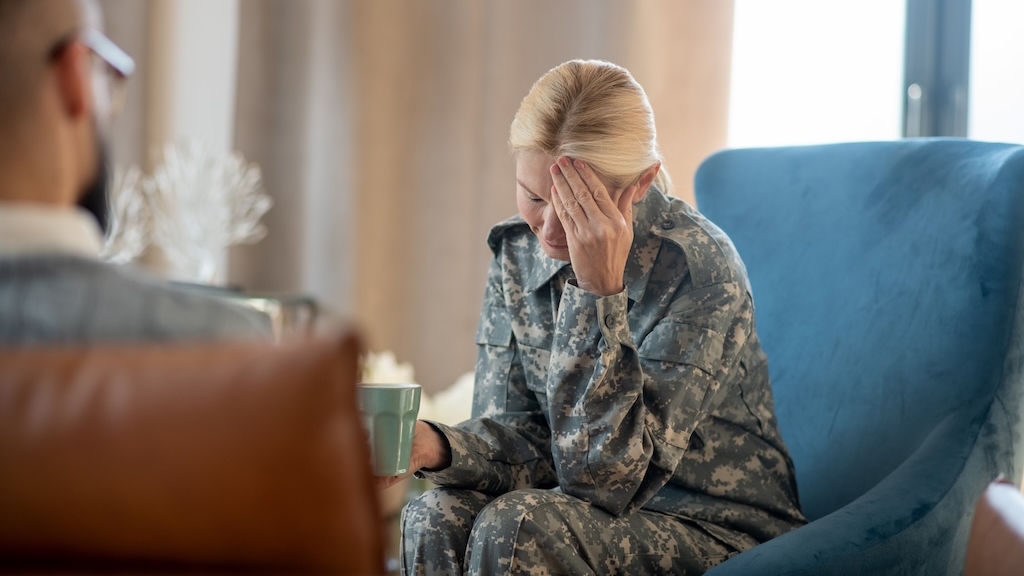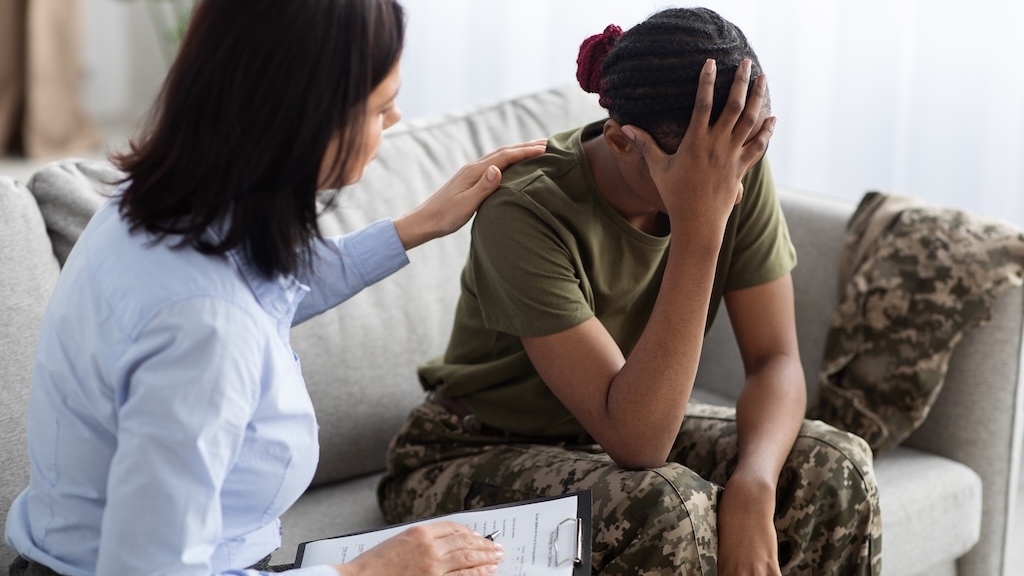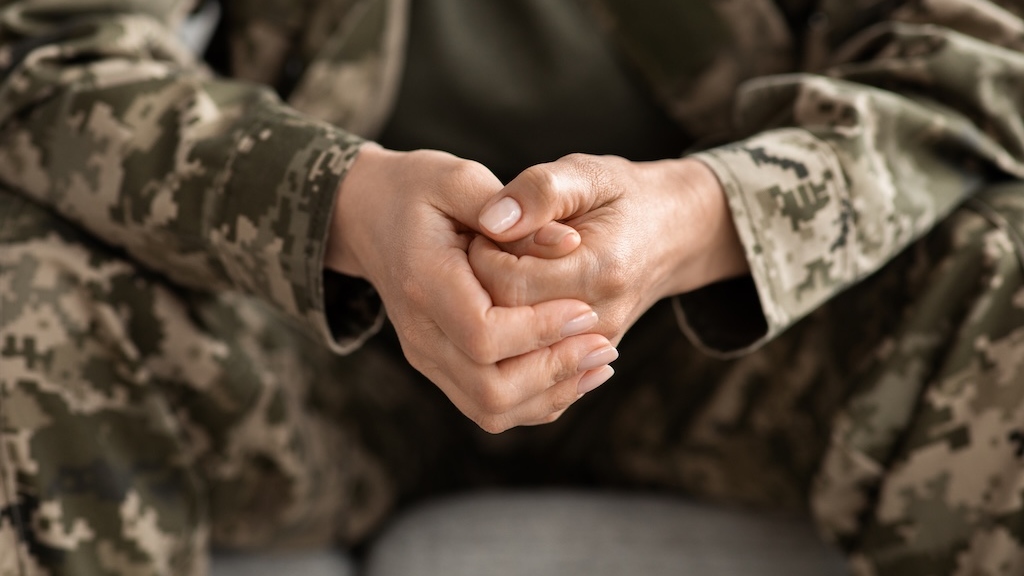Military Sexual Trauma (MST) refers to experiences of sexual assault or repeated, threatening sexual harassment that occurred during military service. These traumatic experiences can have profound and lasting effects on a person’s mental, emotional, and physical well-being. This resource aims to provide education about MST, its impacts, and pathways to healing.
If you or a loved one is looking for specialized support with unique challenges faced by military members, veterans, and their families, including miltary sexual trauma, contact Monima Wellness today.
Call: (858) 500-1542 | Verify Insurance
Understanding Military Sexual Trauma

Military Sexual Trauma can occur during peacetime, training, or war to service members of any gender, age, or rank. However, women in the military face disproportionately higher rates of sexual trauma during their service. According to the Department of Veterans Affairs, about 1 in 4 women and 1 in 100 men who receive VA health care report experiencing MST.
MST is not only about the traumatic event itself but also about the context in which it occurs—within a hierarchical structure where victims may serve alongside or under the command of their perpetrators, and where reporting can lead to retaliation or career damage.
The experience of MST is particularly complex because it combines both interpersonal trauma and institutional betrayal, occurring within an organization that service members trusted and devoted themselves to protecting. At Monima Wellness, this complex nature of military trauma is acknowledged and addressed through specialized, trauma-informed care for military service members and veterans.
Common Effects of Military Sexual Trauma
The impact of MST can manifest in numerous ways and may emerge immediately or years after the traumatic experience. Common effects include:
Psychological Impact
- Post-Traumatic Stress Disorder (PTSD)
- Depression and anxiety
- Substance use disorders
- Eating disorders
- Suicidal thoughts
Relational Difficulties
- Trust issues
- Difficulty forming or maintaining relationships
- Sexual dysfunction
- Social isolation
Physical Symptoms
- Chronic pain
- Sleep disturbances
- Gastrointestinal problems
- Headaches
- Reproductive health issues
Career and Daily Functioning
- Difficulty maintaining employment
- Financial instability
- Housing insecurity
- Problems with daily functioning
Understanding that these responses are normal reactions to abnormal circumstances is essential. They represent the mind and body’s attempts to protect itself after trauma, not personal failings or weaknesses.
The Impact of MST Beyond Mental Health

Military Sexual Trauma doesn’t just affect mental health—it can have far-reaching consequences on a survivor’s entire life trajectory. Recent research by Pritchard (2023) found that veterans who experienced military sexual assault faced significant challenges in post-service employment and transition to civilian life:
- Survivors were less likely to be employed full-time.
- Survivors of MSDT were more likely to be disabled and unable to work.
- Only 24.1% of survivors had secured employment before leaving the military, compared to 33.5% of veterans without MST experiences.
- More than one-third of survivors took over 12 months to find employment after transitioning out of the military, compared to just 18.4% of other veterans.
- Survivors consistently reported feeling less prepared for civilian life across various transition domains.
These findings highlight how MST can create cascading effects that impact economic stability, career development, and overall quality of life long after military service. This underscores the importance of comprehensive support that addresses not only the psychological trauma but also the practical life challenges that survivors face.
Unique Considerations for Women with Military Sexual Trauma
While MST affects people of all genders, women who experience MST often face particular challenges:
- They may already be navigating gender-based discrimination in military settings
- Women are more likely to be of a lower rank than their perpetrators
- They may face skepticism or victim-blaming when reporting
- Pregnancy resulting from assault creates additional medical and emotional complexity
- Impacts on reproductive health may be more extensive
According to recent research, MST experiences affect a disproportionate number of women veterans, approximately 59% of female veterans compared to 4% of male veterans in one large sample. The study also found that female survivors experienced higher rates of retaliation for reporting (67%) compared to male survivors (47%), further complicating their path to support and justice.
These factors can compound the trauma and create additional barriers to healing. At women-centered facilities like Monima Wellness, these gender-specific aspects of trauma are acknowledged and addressed within the treatment approach.
Barriers to Seeking Help for Military Sexual Trauma

Many survivors of MST face significant barriers to seeking help, including:
- Stigma surrounding both sexual trauma and mental health issues
- Fear of not being believed
- Concerns about confidentiality and career impacts
- Previous negative experiences with healthcare systems
- Limited access to trauma-informed care
- Reluctance to engage with VA services due to associations with military settings
- Lack of gender-specific treatment options
Research found that among veterans who experienced military sexual assault, 66% did not report the incident, with 56% citing “fear of retaliation by peers or chain of command” as the reason. Among those who did report, a staggering 67% of women and 47% of men experienced some form of retaliation. This institutional betrayal can create significant mistrust that extends beyond military service, making survivors less likely to seek help even from veteran-focused support services.
Understanding these barriers is crucial for creating more accessible pathways to healing.
Effective Treatment Approaches for MST
Research has identified several evidence-based approaches that can be particularly effective for MST survivors:
According to the Department of Veterans Affairs, two cognitive-behavioral treatments have the highest level of research support for treating PTSD related to MST:
- Cognitive Processing Therapy (CPT): Focuses on understanding how trauma has affected thoughts and beliefs, and developing skills to challenge unhelpful trauma-related thoughts. CPT was originally developed for and rigorously tested among sexual trauma survivors.
- Prolonged Exposure Therapy (PE): Gradually and safely helps confront trauma-related memories, feelings, and situations that have been avoided. This approach has strong supporting evidence for sexual trauma recovery.
Treatment is most effective when it focuses on themes and issues common among MST survivors, including interpersonal relationships, trust difficulties, self-blame, and shame, which may present differently than in other forms of trauma.
The Healing Journey for Military Sexual Assault Survivors
Recovery from Military Sexual Trauma is not a linear process—it involves ups and downs, progress, and occasional setbacks. However, with appropriate support and treatment, healing is possible. The journey typically includes:
- Safety and Stabilization: Establishing physical and emotional safety, developing coping skills for symptom management
- Trauma Processing: Working through traumatic memories and experiences with therapeutic support
- Reconnection and Integration: Rebuilding connections with self and others, integrating experiences, and creating meaning
- Post-traumatic Growth: Moving beyond survival to thriving, finding purpose, and potentially using one’s experience to help others
Levels of Care for Military Trauma & Mental Health Treatment

Depending on the severity of symptoms and individual needs, different levels of care may be appropriate:
- Weekly or bi-weekly sessions with a trauma-informed therapist or trauma-specialized therapist
- Intensive Outpatient Programs (IOP): Structured treatment several days per week while maintaining daily responsibilities
- Partial Hospitalization Programs (PHP): Comprehensive daily treatment while returning home in the evenings
- Residential treatment: 24-hour care in a therapeutic environment
The appropriate level of care depends on symptom severity, safety concerns, and available support systems. Treatment centers specializing in trauma, such as Monima Wellness, often offer multiple levels of care to meet clients where they are in their healing journey.
If you or a loved one is a survivor of Military Sexual Trauma, contact Monima Wellness today to learn more about our trauma treatment programs in San Diego. Our experienced team can help you determine the best level of care for your unique needs and situation.
Resources for MST Survivors
If you or someone you know has experienced Military Sexual Trauma, various resources are available:
VA Services
The Department of Veterans Affairs offers free, confidential treatment for MST-related issues, even if you:
- Don’t have VA disability status
- Didn’t report the incident when it happened
- Aren’t eligible for other VA services
- Weren’t on active duty at the time
Contact your local VA Medical Center and ask to speak with the MST Coordinator, or call the Veterans Crisis Line at 1-800-273-8255 (Press 1).
Research suggests that many MST survivors may be hesitant to engage with VA services due to institutional mistrust stemming from their experiences in the military. If this resonates with your experience, know that non-VA resources and specailized treatment are also available.
Non-VA Resources
- RAINN (Rape, Abuse & Incest National Network): 1-800-656-HOPE (4673) or rainn.org
- Make the Connection: maketheconnection.net/conditions/military-sexual-trauma
- Protect Our Defenders: protectourdefenders.com
- Monima Wellness: Call 858-500-1542 or visit monimawellness.com
Gender-Specific Treatment Options
Many survivors, particularly women, benefit from gender-specific trauma care. Specialized treatment centers offer trauma-informed programs designed to address both the trauma itself and its impacts in the context of lived experiences.
Monima Wellness Center is a women-centered trauma treatment center. We’re proud to offer a healing environment where your unique experiences will be understood and validated—contact us or let us help you verify your insurance to begin your healing journey.
How to Support a Veteran Struggling With Military Sexual Trauma or PTSD

Supporting a loved one who has experienced MST requires patience, understanding, and respect. If someone you care about has shared their MST experience with you, here are some ways to provide meaningful support:
- Believe them unconditionally: Validate their experiences without questioning details or suggesting they misunderstood what happened.
- Practice compassionate listening: Create space for them to share at their own pace without interrupting or offering solutions unless asked.
- Honor their autonomy: Respect their decisions about reporting, seeking help, or discussing their experiences, even if you might choose differently.
- Educate yourself about trauma: Learning about common trauma responses can help you understand reactions that might otherwise seem confusing or concerning.
- Avoid pressure: Don’t push them to report their experiences or seek treatment before they’re ready, as this can replicate feelings of lost control.
- Offer consistent support: Rather than one-time gestures, provide ongoing presence and reassurance that you’re there for the long journey.
- Attend to your well-being: Supporting a trauma survivor can be emotionally demanding, so ensure you have your support system in place.
Remember that secondary trauma can affect close friends, family members, and spouses/partners of MST survivors. Those in supporting roles may benefit from seeking mental health support to maintain their well-being while supporting their loved one.
Take The First Step Toward Healing

Reaching out for help after experiencing Military Sexual Trauma takes tremendous courage. Remember that:
- You are not alone in your experience
- What happened was not your fault
- Your reactions are normal responses to trauma
- Healing is possible with proper support
- You deserve compassionate, trauma-informed care
If you or a loved one is struggling with the effects of Military Sexual Trauma, call Monima Wellness today to speak with our compassionate team about specialized trauma treatment options designed for your unique needs.
References
1. Pritchard, A. J. (2023). Military Sexual Assault, Post-Service Employment, and Transition Preparation among U.S. Military Veterans: New Directions for Research. Victims & Offenders, 18(5), 692-708. https://doi.org/10.1080/15564886.2023.2196662
2. Andresen, F. J., Monteith, L. L., Kugler, J., Cruz, R. A., & Blais, R. K. (2019). Institutional betrayal following military sexual trauma is associated with more severe depression and specific posttraumatic stress disorder symptom clusters. Journal of clinical psychology, 75(7), 1305–1319. https://doi.org/10.1002/jclp.22773
3. U.S. Department of Veterans Affairs, National Center for PTSD. (n.d.). Providing mental health care for those who experienced military sexual trauma. Retrieved May 15, 2025, from https://www.ptsd.va.gov/professional/treat/type/providing_care_mst.asp
4. Vukčević Marković, M., & Živanović, M. (2022). Coping with Secondary Traumatic Stress. International journal of environmental research and public health, 19(19), 12881. https://doi.org/10.3390/ijerph191912881

